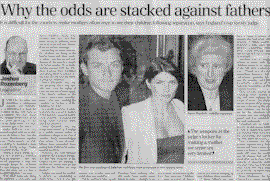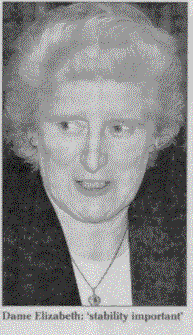| Acknowledgement : images of the article from The Daily
Telegraph, 13 February 2003 :
Rozenburg, who is credited with the article, does not appear to have applied much, if any, analysis to Sloss's pronouncements in the article, as we would have applied. He appears to quote her statements without any question at all about their validity. For instance, he reports that she says the rights of the parents are always equal. Try telling that to all members of UKMM who, having married, have found this gave then no rights. And "the child's welfare is the court's paramount consideration" - who agrees that this should be applied in an unrestricted manner ? "The weapons in the judges locker ... are very limited" - are they really ? We don't think so. "If you put the mother in prison ... it is not actually going to help with contact." Try telling that to the decent men who are perfectly capable of looking after children, but find they have no rights. The judges could give the man custody, that would resolve the 'contact' issue. And apparently "she said mediation worked in a lot of cases ...", well, not according to the men who tell us their stories. Why is there such a difference in accounts ? And why is there such a difference in accounts in so many cases, and on so many aspects ? And we could go on, but what's the point ? |
|
| This is what Rozenburg and Sloss look like :
|
|
| Rosenburg uses the word 'mantra' with regard to
the law expression "the child's welfare is the court's paramount consideration". The word 'mantra' has been looked up in the Longman Dictionary, and Hutchison Encyclopedia, where it is given the meaning : mantra /'mantre/ n a sacred word or sound used as an invocation or incantation (e.g. in Hinduism or Buddhism) [Skt, sacred counsel, formula, fr manyate he thinks; akin to L mens mind - more at MIND ] mantra : In Hindu or Buddhist belief, a word repeatedly intoned to assist concentration and develop spiritual power; for example, om , which represents the names of Brahma, Vishnu, and Siva. Followers of a guru may receive their own individual mantra. These meanings certainly sum up the significance of the philosophy of this term in UK law. |
|



